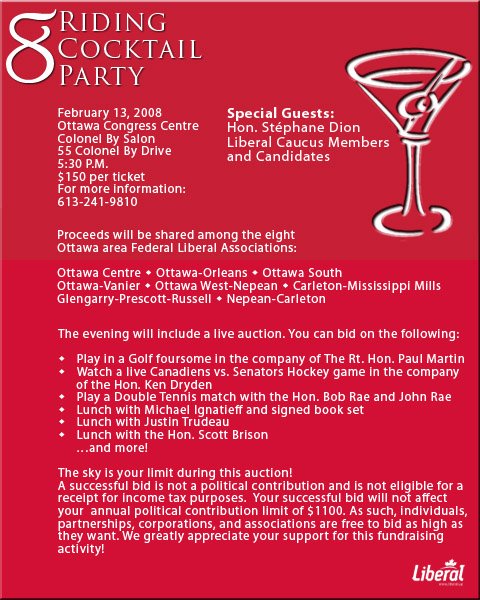The line “Canadians don’t want an election right now” is becoming an interesting bit of spin now used by both the Liberals and the Conservatives regarding both the lifespans of their respective governments and now by the Liberals, in Opposition.
I suppose that part of the rationale for this new but now becoming ensconced in the political lexicon is that for the past three years and three months, we’ve had two successive minority governments and the possibility of an election falling upon Canadians by parliamentary discordance has become more and more probable. The last time we, as Canadians, had a majority government it was up to the Prime Minister to determine when Canadians wanted an elected (or didn’t, whatever the strategy may be). However, now that Prime Minister Harper has passed legislation taking this out of the hands of future majority Prime Ministers, elections will happen for majority governments on fixed dates and the mood of the electorate on such timing issues is moot. Yet, here we are with two successive minority governments and “electoral mood” is something to consider, even if it is unmeasured and declared by party spokesman for whatever strategic reason.
Consider Paul Martin’s minority government in the spring of 2005. The Opposition Conservatives at the time pulled out all of the stops in order to force an election on Paul Martin, a frantic and frenzied leader who looked uncomfortable with the power he sought his whole life. Paul Martin wanted to govern. Desperately. Couple this with mounting scandal and a general consensus that the man that promised over 200 Liberal seats when he took over the reins was floundering and may at best only pull off another minority.
Governments in power declare that Canadians don’t want an election because of a sincere desire to govern. For Paul Martin, this desire to govern was a function of his desire to avoid the dreaded fate of another minority (and leadership review to follow) or worse, defeat to the Conservatives.
The good news for Prime Minister Stephen Harper is that today, there isn’t a looming scandal and the barbarians in Opposition aren’t taking a battering ram to the gate of his small but secure fortress. Indeed, Stephane Dion is at the weakest point in his leadership since he was chosen by Liberal delegates in December of 2006. Harper doesn’t have the benefit of 13 years in power and thus doesn’t as much of a record to run on. When Harper says that “Canadians don’t want an election right now”, like Martin it means that he wants to govern, but unlike Martin it means that he wants to build a solid foundation of trust with Canadians rather than desperately try to patch together the semblance of a working government build upon the cracked concrete of waste and scandal.
Most recently, we’ve seen Michael Ignatieff muse in Opposition that “Canadians don’t want an election right now.” First of all, it is the Opposition’s role to oppose the government. Is this the deputy Liberal leader’s way of lowering expectations for what we should expect from the Liberals on their “opposition” to the Throne Speech. Is Ignatieff preparing us so that we aren’t shocked when Dion and only a handful of Liberals show up to symbolically vote against? But on the topic of the desirability of an election to Canadians, to the best of my knowledge, this poll question has not been asked as of late, so we can safely assume that this is rather a reflection of Liberal wishful thinking that Canadians will spare political parties of judgment at the polls, at least for the next little while. It is indicating, yet not surprising that the Liberals fear judgment of their party, rather than the incumbent Conservatives.
Nobody could reasonably spin that Stephen Harper fears the voters, yet it doesn’t take much creative interpretation to muse that the Liberals are terrified of their own electoral prospects. For which reasons do Canadians desire elections? At a base level, Canadians desire to make their democratic will known at least every 5 years. But to want an election for reasons beyond that, there has to be an overwhelming desire for change. Since such a desire does not exist, Ignatieff is likely right when he says that Canadians don’t want an election right now. However, his reasons (and those of his embattled caucus and leader) are clearly different from those of Canadians and if the Liberals hope to lead, their desires regarding election timing and change must be aligned with at least that of a plurality of the electorate.
